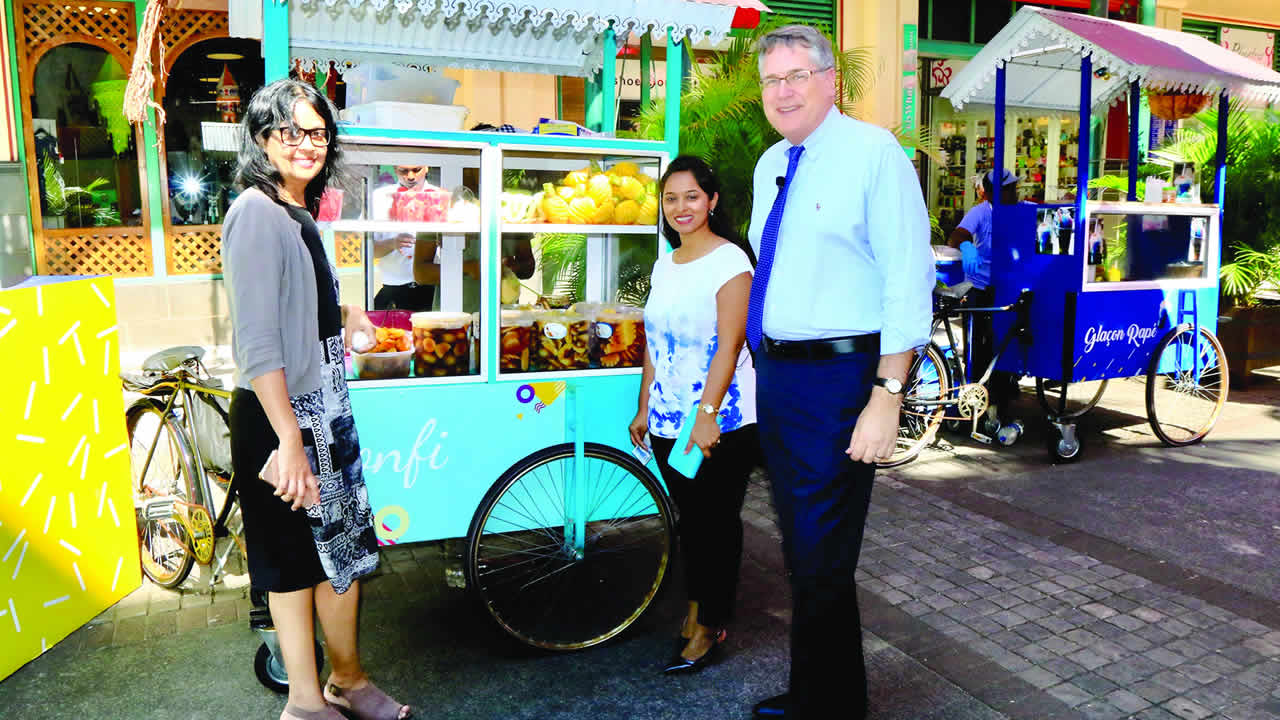
It was this year that Ambassador David Reimer has been appointed as ambassador of the USA in Mauritius. Before coming to Mauritius, the ambassador has served various European and African countries. In this interview, he talks about his priorities and evaluates the diplomatic ties between the U.S. and Mauritius.
What is your first impression of Mauritius?
I have been particularly impressed by the beauty of the country and the warmth and openness of the people. That is a great combination! And I love the diversity of food as well. Every week I try something different, and it never disappoints.
What are your priorities as the newly-appointed U.S. Ambassador to Mauritius?
I hope we can broaden and deepen the already strong relationship between Mauritius and the United States, particularly in the economic and commercial spheres. And, of course, I plan to continue our partnership with the government and people of Mauritius on democracy, human rights, good governance, sustainable development, and empowering women.
How can we strengthen the existing cultural and historical links between Mauritius and the United States?
We will continue to bring American arts and culture to Mauritius. Last December, we hosted the New York City based hip-hop group “Soul Inscribed” to conduct music workshops with the children of Cité St. Catherine and to headline the Porlwi Music Festival.
I would also encourage Mauritian youth to consider studying in the United States, even for one semester, to share Mauritian culture with Americans. Another option is our very popular Young African Leaders Initiative program.
I also encourage my American diplomats to get out and meet as many different Mauritians as possible. These opportunities will enhance and increase the already strong ties between our two countries.

In your opinion, how can we strengthen our countries’ economic and commercial ties?
I’m hoping we can increase investment and bilateral trade. We can start by bringing more U.S. companies to Mauritius, which will help both of our countries. Increased U.S. investment would help spur the Mauritian economy and create new jobs. On the trade side, the United States is a major buyer of textiles and apparel under the U.S. African Growth and Opportunity Act (AGOA).
However, I think it is important that Mauritius needs to diversify its exports to the United States and start to work on a trade strategy to do that. Mauritius is actually running a large trade surplus with the United States, so I will focus especially on increasing purchases of U.S. goods and services. Other sectors beyond textiles show room for growth, particularly as the Mauritian economy evolves into an innovation hub.
Americans love to travel overseas, but generally, it is not the role of the U.S. Government to promote tourism to foreign countries. Promoting Mauritius as a leisure destination would be up to the Ministry of Tourism and the Mauritian tourism sector.
Mauritian entrepreneurs can partner with leading U.S. companies on cutting edge technologies like pharmaceuticals, information and communication technologies, and financial technology. The energy sector looks promising, too — there is quite a lot of interest by U.S. companies in attending the Africa Energy Forum in Mauritius in June, for example. In short, this is a great question and I see enormous opportunities to strengthen economic links during my time as Ambassador.
How can Mauritius draw benefits from the U.S. expertise in different sectors?
Sharing U.S. expertise is a big part of what we do at the U.S. Embassy. In the last year alone, we arranged conferences and provided training on entrepreneurship, empowering women, intellectual property reform, and a whole host of scientific topics.
A good recent example was an event we co-sponsored where a U.S. expert trained sugar industry officials on cutting edge technologies to improve crop yield. The United States is the global leader in so many different sectors, including ones that will benefit Mauritius as it continues diversifying, developing, and competing globally.
How much more can Mauritius benefit in terms of education, besides scholarships?
The U.S. Government does not give out many scholarships, not even to U.S. citizens. However, almost all U.S. colleges and universities offer scholarships for qualified applicants. For example, most of my education was paid for through scholarships. I would argue, though, that even starting an education plan or using savings is money well-spent in the long-term on a U.S. education.
Education should be life-long and the U.S. Embassy offers a variety of programs through our Information Resource Center at the U.S. Embassy and our Harper Lee Center/American Corner at Carnegie Library in Curepipe.
We also offer English language programs, a “Let’s Talk” speaker program, and EducationUSA advising and orientation sessions. In addition, the U.S. Embassy administers a series of exchange programs including the Fulbright and Hubert H. Humphrey Fellowship programs and our very successful and popular Young African Leaders Initiative.
What can be done to attract more American tourists to Mauritius?
Mauritius is not widely known in the United States. Mauritius could raise its profile in the United States so that it becomes known as a preferred destination for tourists. The challenge for Mauritius will always be one of distance and cost.
It takes more than a day to travel from the United States to Mauritius by air. Consequently, most U.S. tourists looking for a tropical vacation go to the Caribbean or Hawaii or Florida. However, once Americans learn about the beauty, culture, cuisine, and diversity of Mauritius, I think many Americans would consider spending time here.
Are there any campaigns done in the U.S. to promote Mauritius as a leisure destination?
Americans love to travel overseas, but generally, it is not the role of the U.S. Government to promote tourism to foreign countries. Promoting Mauritius as a leisure destination would be up to the Ministry of Tourism and the Mauritian tourism sector. Those campaigns may exist, but I don’t recall seeing any when I was in the United States.
You have worked in both European and African countries. Is it a challenge for you to work in African countries, as compared to other well-developed countries across the globe?
No, it is not a challenge at all. I love serving in Africa and I’m thoroughly enjoying serving in Mauritius. The issues in this region are interesting and of critical importance to our government.
 J'aime
J'aime














